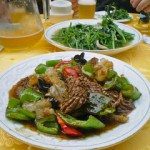A Food Fun Travel Guest Post
The life of a college student is often a bustling mix of classes, studying, and socializing, with food playing a crucial but sometimes overlooked role. However, food is more than just a daily necessity. It can be an exciting avenue for exploration and cultural education. For students interested in culinary adventures, college campuses and their surrounding areas often offer a plethora of global cuisine options. From authentic Thai dishes to Italian delicacies, the world of flavors is at your doorstep.
Balancing the demands of college life, including assignments and extracurricular activities, might make you think, “I wish there was a paper writing service to write a speech for me,” especially when your culinary explorations inspire you to share your experiences. Embracing the role of a student food critic not only enriches your college experience but also expands your cultural and culinary horizons.
Embarking on Your Culinary Journey
Research Local and Campus Eateries
Embarking on a culinary journey begins right at your college campus. Many colleges are melting pots of culture, offering a diverse array of dining options that showcase flavors from around the globe. Start your exploration by visiting different eateries on campus, and then gradually expand your search to the surrounding areas.
Utilizing social media platforms, engaging in campus forums, and following local food blogs can be incredibly beneficial. These sources often provide a wealth of information about both well-known and lesser-known dining spots popular among students. They can guide you to discover hidden culinary gems and student-favorite restaurants that you might not have stumbled upon otherwise.
Additionally, participating in food-related campus events or festivals can provide a firsthand experience of diverse cuisines. These events are often organized by student groups or cultural associations and offer a taste of authentic dishes from various countries.
Understanding Global Cuisines
To truly appreciate the global cuisines you encounter, invest time in understanding their roots. Learning about the history, cultural significance, and traditional cooking methods of different dishes enriches your dining experience far beyond the palate. This knowledge not only enhances your appreciation for the cuisine but also deepens your understanding of the culture it represents.
When visiting eateries, don’t hesitate to engage with the staff or chefs. Many are passionate about their culinary heritage and are often eager to share insights about their traditional cooking techniques and the stories behind their dishes. This interaction not only adds a personal touch to your dining experience but also provides authentic knowledge that you won’t find in books or online.
Becoming a Connoisseur
Develop Your Palate
As a burgeoning food critic, developing a discerning palate is essential. Start with cuisines that are familiar to you, and then gradually challenge yourself to try more exotic and unfamiliar dishes. This gradual approach helps build your taste preferences and understand various flavor profiles. Keeping a journal of your culinary experiences can be beneficial. Note down specific aspects of each dish you try – what flavors stood out, what ingredients were new to you, and how the dish made you feel. This reflective practice will not only aid in developing your palate but also in articulating your culinary experiences more effectively.
Share Your Experiences
In today’s digital age, sharing your culinary journey with others can be both fulfilling and influential. Consider starting a blog, a YouTube channel, or a social media page dedicated to your food explorations. Documenting your experiences and reviews can guide fellow students in their culinary explorations and provide a platform for the exchange of ideas and recommendations. When writing reviews, maintain honesty and respect. Constructive criticism, highlighting both the positives and negatives of your dining experience, offers a balanced perspective to your audience. Remember, your reviews can have a significant impact on the eateries you visit and the people who read your critiques.
Practical Considerations
Budgeting for Your Adventures
Keep an eye on your budget. Exploring cuisines doesn’t have to be expensive. Look for student discounts, happy hour deals, or smaller portions to save money. Sometimes, joining or forming a food club can be beneficial. It allows group discounts and the chance to share dishes, reducing individual costs.
Balancing Food Exploration and Health
While indulging in diverse cuisines, don’t forget to maintain a balanced diet. Try to include healthy food choices in your routine. Be mindful of dietary restrictions or allergies. Always check ingredients or discuss with the restaurant staff if you have specific dietary needs.
Conclusion
Embracing the role of a student food critic can transform your college experience, turning every meal into an opportunity for exploration and learning. As you delve into the world of global cuisines, remember to enjoy each bite and share your experiences with others. Your culinary adventures can bring a new dimension to your college life, offering a delicious break from studying and assignments. And for those moments when academic demands take precedence, don’t forget that DoMyEssay is there to help you balance your academic and culinary explorations.
Author Bio
Essay Writer Nicole Hardy, a distinguished journalist in the realms of education and the arts, is celebrated for her thorough and discerning coverage of performing arts education. Her career, which extends beyond ten years, has solidified her status as an authoritative figure in this domain. Hardy is praised for her thorough analyses and captivating writing manner. She earned her Master’s in Journalism from the University of Arts, with a focus on arts and culture journalism.




